COVID-19
Canadian gov’t accepted risks of COVID shots’ unknown safety and efficacy, Pfizer contract reveals
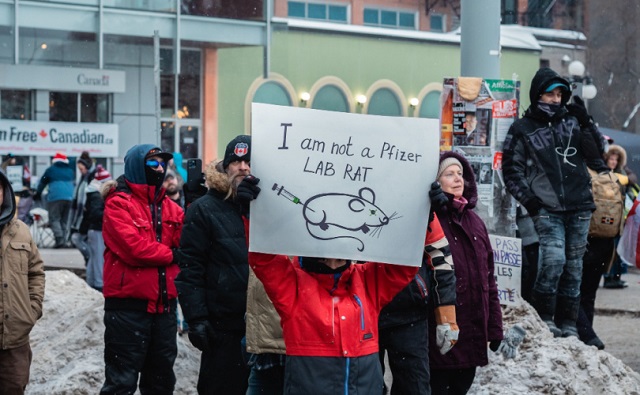
A boy holds up a sign at a Freedom Convoy protest in February 2022
From LifeSiteNews
‘(T)here may be adverse effects of the vaccine that are not currently known,’ the agreement reads
The Canadian federal government’s recently disclosed COVID-19 vaccine contract with Pfizer for millions of doses of the mRNA-based experimental shots shows the government agreed to accept the unknown long-term safety and efficacy of the shots.
The contract was revealed by The Canadian Independent after it obtained it through an access to information request. Although parts of the contract are heavily redacted, it is clear that the federal government of Prime Minister Justin Trudeau knew there was no promise the shots would work and were 100% safe.
“Purchaser further acknowledges that the long-term effects and efficacy of the vaccine are not currently known and that there may be adverse effects of the vaccine that are not currently known,” reads a copy of the federal government’s contract with Pfizer dated October 26, 2022.
The Trudeau government also had to acknowledge by signing the contract that the COVID shot and its materials were “rapidly developed due to the emergency circumstances of the COVID-19 pandemic,” and would be further studied after their rollout.
The “Manufacturing and Supply agreement between Pfizer and Minister of Public Works and Government Services Canada” is 59 pages and includes a section that says the shots would not be serialized. When a vaccine is serialized, it is given a unique number or other identification that can track its complete journey through the supply chain.
Fully redacted in the contract are sections 8 and 9, which likely relate to titled “indemnification” and “insurance and liability,” as was recently revealed by a leaked contract between Pfizer and South Africa.
LifeSiteNews has confirmed that the redacted contract in question released by The Canadian Independent is genuine, with Public Services and Procurement Canada’s media department.
“Public Services and Procurement Canada (PSPC) confirms this is a redacted copy of a contract between PSPC and Pfizer Canada ULC,” PSPC media relations representative Alexandre Baillairgé-Charbonneau wrote to LifeSiteNews.
Health Canada ordered 238 million COVID injections from Pfizer Canada, which includes some 30 million for 2023 and 2024.
The details of the Pfizer contract do not disclose how much the government spent on the jabs.
The Trudeau government, with the help of the Department of Health, heavily promoted the COVID jabs, which were rushed to market. It is still promoting the shots, this time the recently approved booster.
In 2021, Trudeau said Canadians “vehemently opposed to vaccination” do “not believe in science,” are “often misogynists, often racists,” and even questioned whether Canada should continue to “tolerate these people.”
A recent study done by researchers at the Canada-based Correlation Research in the Public Interest found that 17 countries have a “definite causal link” between peaks in all-cause mortality and the fast rollouts of the COVID shots and boosters.
LifeSiteNews reported last month how the Polyomavirus Simian Virus 40 (SV40), which is a monkey-linked DNA sequence known to cause cancer when it was used in old polio vaccines, has been confirmed by Health Canada to be present in the Pfizer COVID shot, a fact that was not disclosed by the vaccine maker to officials.
COVID-19
WATCH: Big Pharma scientist admits COVID shot not ‘safe and effective’ to O’Keefe journalist

From LifeSiteNews
‘None of that stuff was safe and effective. We didn’t do the typical tests,’ Joshua Rys of Johnson & Johnson said to one of James O’Keefe’s undercover journalists.
A lead scientist for a global pharmaceutical firm disclosed on hidden camera that his firm’s COVID-19 vaccine underwent rushed testing, lacked research, and admitted that, in direct contradiction to the Biden administration’s constant refrain, the drug was not “safe and effective.”
“None of that stuff was safe and effective. We didn’t do the typical tests,” said Joshua Rys, a lead regulatory affairs scientist for Johnson & Johnson (J&J), not realizing that he was being filmed by one of James O’Keefe’s undercover journalists.
BREAKING: Johnson & Johnson Lead Scientist Confesses J&J COVID-19 Vaccine Was 'Not Safe and Effective,' Reveals “Lack of Research” From Rushing to Release Vaccine: “People Wanted It, We Gave It to Them”
“Do you have any idea the lack of research that was done on those products… pic.twitter.com/yEeyXy8toI
— James O'Keefe (@JamesOKeefeIII) July 15, 2025
Rys explained that normally a new drug undergoes an extended period of testing, including human trials, but the COVID-19 vaccine circumvented those safety measures in order to rush the product to the public.
“This was just, ‘Let’s test it on some lab-rat models, analyze and see if it works,” said Rys, “and just throw it to the wind and see what happens.”
“I’m sure somebody is going to get sued for that stuff, eventually,” he predicted.
“Do you have any idea [of] the lack of research that was done on those products?” asked the J&J lead scientist.
“People wanted it. We gave it to them,” said Rys.
O’Keefe later approached Rys to ask what led him to tell a total stranger that his product was not safe and effective, but Rys evaded O’Keefe and his probing.
O’Keefe explained that the work of his O’Keefe Media Group (OMG) undercover journalists is crucial because, he claimed, up to 80 percent of the revenue cable and other news organizations derive from ads comes from Big Pharma.
OMG is “pulling back the veil on the corruption and lies in our government, in our corporations, in the pharmaceutical industry,” said O’Keefe, ominously noting that the last time he did an investigation into Big Pharma organization Pfizer, he was indefinitely suspended from Project Veritas, the company he founded.
COVID-19
Japan disposes $1.6 billion worth of COVID drugs nobody used
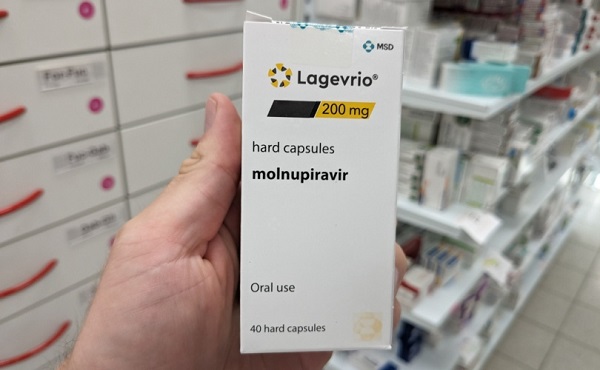
From LifeSiteNews
The nation’s health ministry has already trashed 2 million doses of PaxlovidPACK and Lagevrio, and will dispose of 1.77 million doses of Xocova by the end of February 2026.
Japan is disposing of $1.6 billion worth of COVID-19 drugs that went unused and are now expired in a dramatic disconnect between government projections and reality.
The Japanese Broadcasting Corporation reported that the nation’s health ministry has already trashed 1.75 million patients’ worth of PaxlovidPACK and 780,000 patients’ worth of Lagevrio doses, and will dispose of 1.77 million patients’ worth of Xocova by the end of February 2026.
The government had been required by law to purchase enough oral COVID drugs for 5.6 million people, to be distributed free of charge through May 2023, at which point the virus was downgraded to the same threat level as normal seasonal influenza. But 2.5 million, a little under half the supply, remained unused by the time they hit their expiration dates.
The Star added that the value of the destroyed drugs is estimated to be roughly 240 billion yen, or 1.6 billion US dollars.
Across the world, governments took drastic action to counter the COVID pandemic, based in large part on exaggerated assumptions about the virus’s transmissibility and threat to non-elderly individuals without comorbidities. A large body of evidence has found that mass restrictions on personal and economic activity undertaken in 2020 and part of 2021 caused far more harm than good in terms of personal freedom and economics as well as public health, and that lives could have been saved through far less burdensome methods, such as the promotion of established therapeutic drugs, narrower protections focused on those most at risk (such as the elderly and infirm), and increasing vitamin D intake.
In Florida, the first report by a grand jury impaneled by Republican Gov. Ron DeSantis determined that lockdowns did more harm than good, that masks were ineffective at stopping COVID transmission, that COVID was “statistically almost harmless” to children and most adults, and that it is “highly likely” that COVID hospitalization numbers were inflated.
Much like the controversial COVID vaccines, concerns were raised about the safety and effectiveness of COVID therapeutics such as Paxlovid and Lagevrio as well.
In May, former Japanese minister of internal affairs and communications Kazuhiro Haraguchi announced he had cancer, and said testing of the lesions linked it to spike proteins from the COVID-19 vaccine he had received two years before.
-
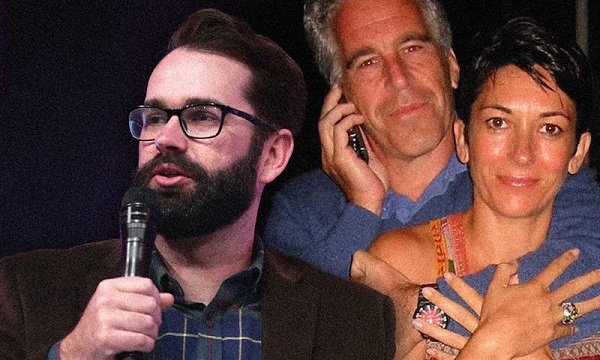
 International2 days ago
International2 days agoMatt Walsh slams Trump administration’s move to bury Epstein sex trafficking scandal
-
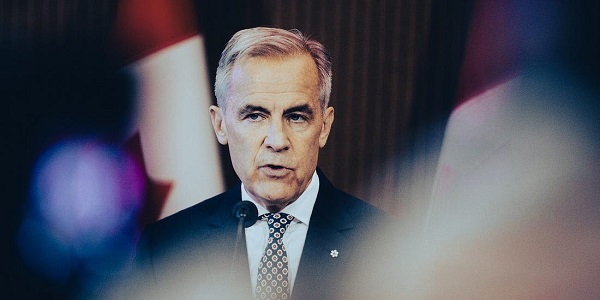
 National2 days ago
National2 days agoDemocracy Watch Blows the Whistle on Carney’s Ethics Sham
-

 Energy1 day ago
Energy1 day agoIs The Carney Government Making Canadian Energy More “Investible”?
-
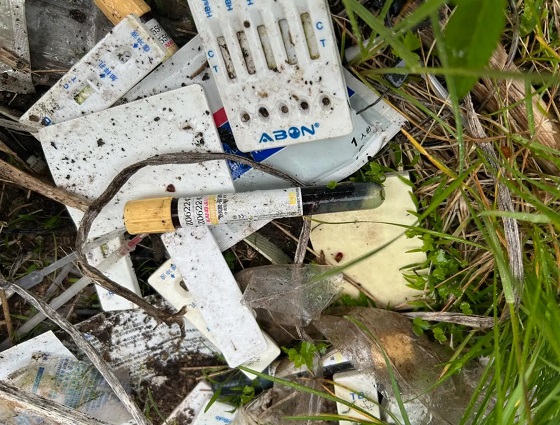
 Immigration1 day ago
Immigration1 day agoUnregulated medical procedures? Price Edward Islanders Want Answers After Finding Biomedical Waste From PRC-Linked Monasteries
-

 Business1 day ago
Business1 day agoDemocracy Watchdog Says PM Carney’s “Ethics Screen” Actually “Hides His Participation” In Conflicted Investments
-

 Business1 day ago
Business1 day agoCompetition Bureau is right—Canada should open up competition in the air
-

 Business1 day ago
Business1 day agoIt’s Time To End Canada’s Protectionist Supply Management Regime
-
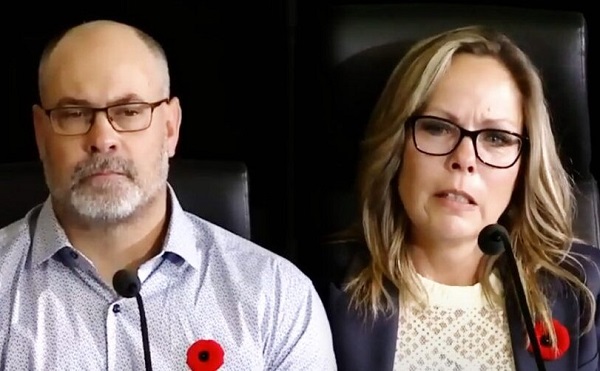
 COVID-191 day ago
COVID-191 day agoFreedom Convoy leaders’ sentencing hearing to begin July 23 with verdict due in August






